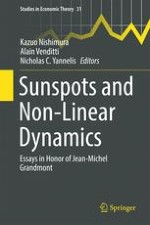2017 | OriginalPaper | Buchkapitel
12. Uncertainty and Sentiment-Driven Equilibria
verfasst von : Jess Benhabib, Pengfei Wang, Yi Wen
Erschienen in: Sunspots and Non-Linear Dynamics
Aktivieren Sie unsere intelligente Suche, um passende Fachinhalte oder Patente zu finden.
Wählen Sie Textabschnitte aus um mit Künstlicher Intelligenz passenden Patente zu finden. powered by
Markieren Sie Textabschnitte, um KI-gestützt weitere passende Inhalte zu finden. powered by
